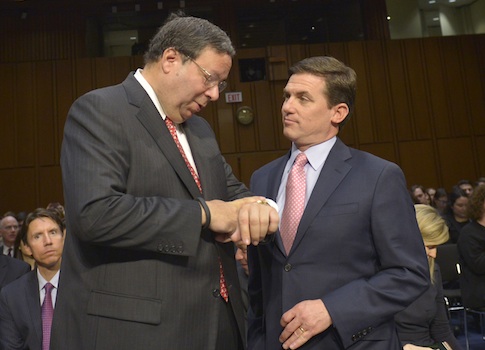Comcast—the cable television and Internet service giant with extensive ties to the Democratic party—could dominate the market for local political advertising if the company’s proposed $45 billion merger with Time Warner Cable (TWC) is approved, according to industry sources.
The potential merger’s impact on the $5.4 billion local cable advertising market, including political advertising, has been largely absent from public debate as the companies seek approval from regulators at the Justice Department and Federal Communications Commission (FCC).
Comcast sought to assuage competitive concerns about the deal by announcing in February that it would shed about 3 million subscribers, bringing its combined customer base with TWC to 30 million. However, sources say the 30 million figure does not reflect the company’s growing involvement in the local advertising market.
Other cable and satellite providers such as Verizon and DISH have outsourced their ad sales to Comcast and TWC. The combined companies could reach as many as 50 million households with ads sold as a result of these "rep deals."
Comcast, like other cable companies, owns two minutes of advertising per hour on every network that they contract with. These ads are seen at the local level. The companies use some of that time to advertise their own wares and sell the rest to national, regional, and local advertisers.
Following the merger, Comcast would own 80 percent of the cooperative through which national advertisers purchase airtime at the local level, 54 percent of the cooperatives though which regional advertisers purchase this airtime, and 69 percent of the market through which local advertisers purchase airtime. Locally owned businesses fear that this consolidation will give greater power to regional and national businesses.
Small businessman Roy Hunter, owner of Sarasota Bay Real Estate in Florida, told the Wall Street Journal earlier this month that he was "held for ransom" after Comcast signed a deal with Verizon to conduct its ad sales in the area. Hunter said his business was priced out of the ad market in Sarasota County.
"Given that Comcast owns some control of each aspect—national, regional, and local—they could actually grant favors to particular political candidates," the executive said.
For example, Comcast-TWC could cut deals on ad rates for some favored candidates. Other campaigns could be charged more to buy ads covering broader geographic areas, eliminating the benefits of geo-targeting.
The situation is "potentially rife with abuse" because of the relatively unregulated nature of the local advertising industry and the political leanings of Comcast, the executive said.
Comcast’s employees, their family members, and the company’s political action committee have donated more than $33 million to political campaigns since 1989, with roughly $18 million of that going to Democrats. Comcast Chairman and CEO Brian Roberts and Executive Vice President David Cohen also have close ties to the Obama administration. They raised millions for President Barack Obama’s campaigns.
"When it comes to political advertising and spending, you have this in the hands of one company—a company which at the helm has a staunch Democrat," the executive said. "They can, if they want to, be able to steer certain advantages to the Democratic Party."
Local political ad spending on cable totaled $625 million in 2012.
Joelle Terry, a director of corporate communications at Comcast, said in an email that advertising controlled by cable operators such as Comcast "represents only a small portion of the overall and political advertising markets."
"Broadcast advertising remains the primary source of supply for advertising, including political advertising," Terry said. "Cable network sold advertising also is a major source of advertising, including political advertising."
Terry added that Comcast "complies with FCC requirements related to political advertising."
"We accept qualifying ads from candidates from all parties. Candidates can buy at the zone level right now and will continue to be able to do so if the transaction is approved."
Critics argue that Comcast has still not addressed its potential control over the $5.4 billion market for local commercials. Local advertisers say they prefer this "local availability" because they can geo-target specific zones of customers or voters, rather than the more expensive and geographically broader advertising on broadcast and cable networks.
Comcast and TWC devoted only about a page to advertising markets in their 180-page merger statement to the FCC. "The transaction will not result in any competitive harm to advertising markets," it said.
Lawmakers, independent cable networks, and consumer advocates raised additional concerns about the merger at a Senate hearing earlier this month.
Critics said it could lead to less competition and higher prices in the pay TV and broadband Internet markets. Comcast-TWC would be the dominant pay TV provider in 23 of the top 25 television markets and hold nearly 40 percent of broadband subscribers.
Sen. Al Franken (D., Minn.) has been one of the most outspoken opponents of the deal. He said on C-SPAN earlier this month that Comcast was "swarming Capitol Hill [with] their lobbyists."
Comcast employs more than 100 lobbyists, including former staffers for the House and Senate Judiciary Committees, and spent at least $200,000 on congressional lobbying in February and March.
Both committees oversee antitrust enforcement and competition policy at federal agencies. Comcast has donated thousands to almost every Senate committee member since 2008, with larger sums going to Democrats.
Franken also accused Comcast of failing to address competition concerns after it purchased NBC Universal for nearly $14 billion in 2011.
"The first thing I would do is not let the largest cable TV company buy the second-largest cable TV company," he said.
